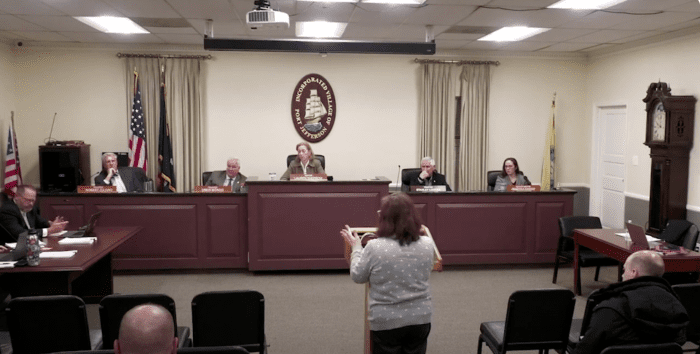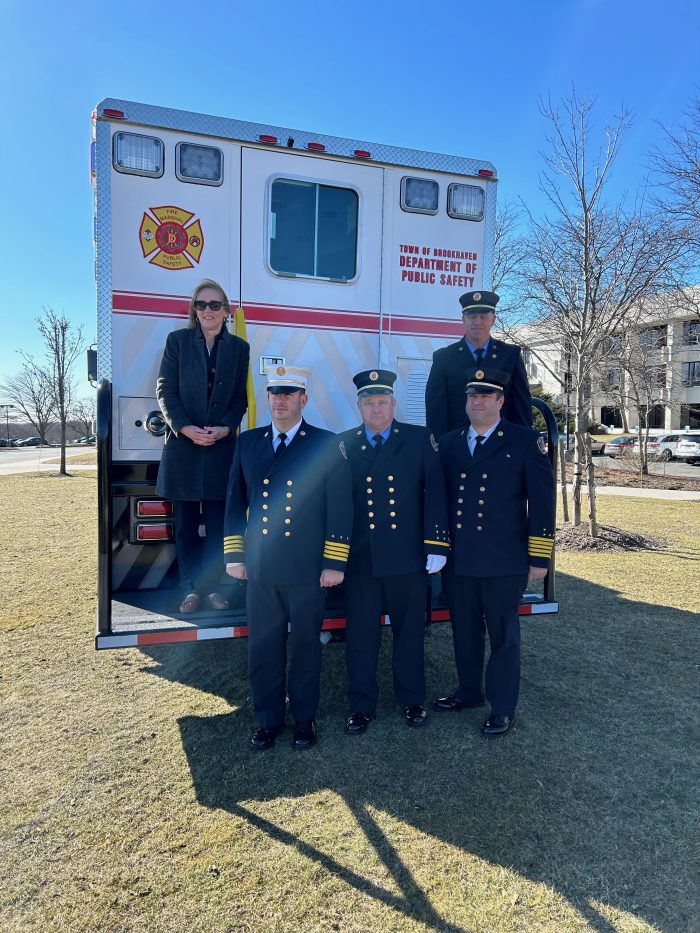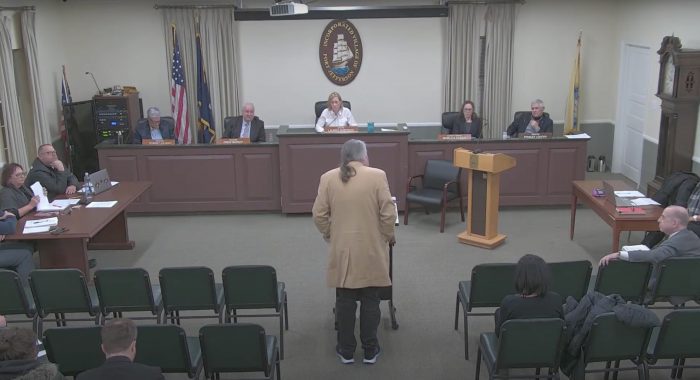By Lynn Hallarman
Village officials honored the service of the Port Jefferson Fire Department at the board of trustees meeting at Village Hall on March 27.
Chief Soeren Lygum, first Assistant Chief Anthony Barton and third Assistant Chief Christian Neubert were present to accept special recognition on behalf of the fire department.
“I thought it was an important time to recognize the fire department after the recent fire in the Port Jefferson village on Feb. 22 in which you preserved the health and safety of many people in the community by curtailing that blaze,” Mayor Lauren Sheprow said.
“We’ve had a great working relationship with Mayor Sheprow,” Lygum said. “We’re constantly communicating with her when anything is happening in the village.”
The mayor recounted numerous fire and rescue operations for the public, in which the fire department participated.
Villagers were reminded they could become volunteer firefighters. “You can stop by, and we have applications readily available,” Lygum said.
Dangerous roadways
Several residents spoke about long-standing problems with traffic accidents, dangerous intersections and a lack of walkable corridors into the village.
Janice Fleischman described the “multiple scary moments with cars” walking her dog on Old Post Road East near Laurel Drive. “It’s gotten worse because of debris and encroaching foliage,” she said.
Fleischman cited data issued by Suffolk County between 2017 and 2021 demonstrating that the county had the highest number of people who died while walking, bicycling, riding a motorcycle or driving than any other county in New York State during the same period.
“The suburbs were engineered for cars, not for people to walk,” she said. “Now we know that’s not good for our health.” She advocated for a network of sidewalks and to remediate dangerous intersections before “a terrible accident happens.”
Lisa Jaeger reiterated Fleischman’s concerns about dangerous walking conditions on Old Post Road near Laurel Drive.
“I can’t tell you how often I’ve almost hit people coming around that corner from Laurel Drive going down the hill toward Old Post Road. It’s very dangerous,” she said
Barbara Sabatino described perilous traffic conditions and numerous accidents near her home on East Broadway. She advocated for traffic-calming measures and enforcement.
Trustee Rebecca Kassay responded to concerns by informing the public of a recent walkability study completed by the village. The next steps will include strategic discussions with the planning board and trustees, and seeking grant funding to address dangerous areas in the village’s most trafficked areas.
Municipal parking administrator position
Kevin Wood, an employee of the Village of Port Jefferson for the past seven years as the municipal parking administrator, gave an impassioned speech arguing against eliminating his position as part of the tentative 2024-25 fiscal budget.
“I won’t go into the complexity of our system but, suffice it to say, it is extremely complicated and busy. The village needs and deserves a dedicated parking administrator,” Wood said.
He added, “Port Jefferson Village processes 250,000 transactions per eight-month season. No other village on Long Island even comes close to that. Parking brings in good revenue.”
Wood highlighted some of his accomplishments in the past several years, including the revenue-generating digitally managed parking; the completion of the “first downtown parking lot in 50 years” — the Barnum parking lot, that is free for village employees; EV charges, merchant billing, pay-by-plate parking and lot security cameras.
“Parking is hugely complicated. It takes somebody to negotiate and bring what we’re up against to the board,” Wood said.
Sabatino questioned the elimination of the parking administrator position. “The parking is so complex nowadays I can’t see eliminating the position without something else taking its place,” she said.
Village attorney, David Moran, responded: “The board, when it decides to act, will act in this room publicly, and if it decides to go whatever way, we’ll fully lay out the plan in this room.”
The board of trustees will hold a work session Wednesday, April 10, at 5 p.m.










